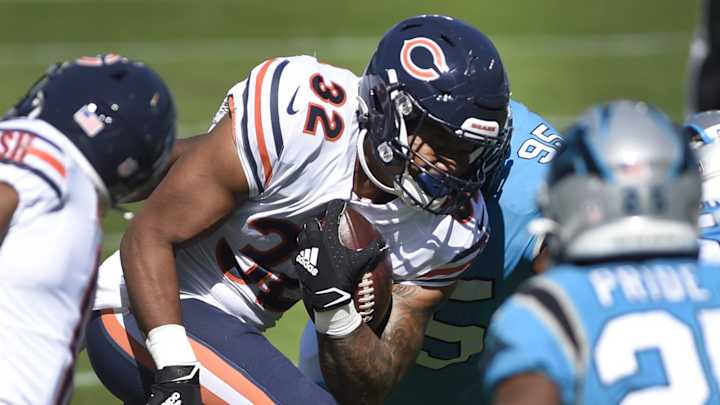The Rise and Free Fall of the Bears Running Attack

David Montgomery held his fingers about an inch apart.
"It's this close," the Bears running back said. "It's always just that little piece and this close."
Of course, he was talking about the running game for the Bears. Look at the rushing statistics in the league and whether the Bears are an inch away depends on your goal for the running game.
If they want to be 31st in the league, they're that close. They're not close to being a productive running attack.
The team of Walter Payton, Gale Sayers, Matt Forte, Rick Casares, Neal Anderson and Willie Galimore is a yard from having the league's lowest rushing total and averages the fewest yards rushing per game in the NFL.
There is no easy answer to turning it around, and when they are losing offensive linemen like they have with center Cody Whitehair and guard James Daniels, that inch Montgomery spoke of looks like miles.
This week they're facing a Saints defense ranked fourth in the league against the run. When they tried to run on the Saints last year, they gained 17 yards.
The situation is bleak.
"You've just got to keep trusting it, keep going to work every day and understanding that it's going to pop," Montgomery said. "Something's going to happen. We've just got to keep fighting.
"That's all you can do."
The mystifying part of it all is they came out of training camp with a complete reversal from last year, when they finished 29th in yards per rush and 27th in total rushing yards. They were running and doing it well.
"I feel like we did a lot of stuff we were doing in camp the first couple weeks," tackle Charles Leno Jr. said. "Then Atlanta came around, then after Atlanta it was the Colts."
The Colts game signified the start of four games in five weeks agains defenses ranked 11th or better against the run. The Bears treated all of these games like they'd not simply faced a top rushing team, but like they were trying to run on the 1985 Bears defense. After averaging 138 yards in three weeks, they averaged just under 44 yards a game.
The scary part is they couldn't even run on Carolina, which was the one poor run defense they faced in there. They gained 63 yards against a team 25th against the run.
"We got to this point where we're playing from behind," Leno said. "When you have to drop back often, it's tough to get that run game going.
"That's something we have to do a better job of starting fast. That's how we can get our run game going."
There is some truth to this, but the reason they're playing from behind isn't because the defense caved in. This didn't happen until Monday night.
They trail in games because the running game goes nowhere while opponents manage a score or two. And then they're behind.
It's a case of which came first, the chicken or the egg. And their opponents don't care. They'll devour the chicken and the egg.
The injuries haven't helped. They threw Rashaad Coward in at left guard for the first time in his life. He's going into his third game at the position now.
Now it's unlikely they'll have Whitehair back from a calf injury.
"(If) Cody's out, man, we're just losing a great leader, a hard worker, somebody who gets us on the right spot," Leno said.
Sam Mustipher starts for the first time in his career. Last week's action after Whitehair's second-half injury was his first NFL playing time.
"I know what type of person Sam is," Leno said. "He's a football player, man. He's one of those guys that shows up every day, does his job to the best of his ability. There's a lot of fight in that guy. So, it'll be fun."
Losing Tarik Cohen in the Falcons came coincided with the end of the running attack. It took away an explosive presence.
Taking Mitchell Trubisky out of the lineup removed a few rushing yards on scrambles. More importantly, it removed the threat of a quarterback who could pull the ball back on RPO or bootlegs and run it or roll out to throw.
"I think there's probably a little bit of everything involved with that," coach Matt Nagy said. "Some of that is, for us, just understanding the way that we're executing, the way that we're calling plays, and then who our opponent is. There's a little bit of everything."
The person calling plays isn't an issue with the running game.
Last year Nagy faced many accusations he quit on the running attack. It came to a head in the loss to the Saints, when they ran it seven times. But this year the Bears have stayed with the run as long as possible—at times even to a fault.
The production is the issue, or lack therof.
They've dropped from 4.87 yards a run after three weeks to 2.43 yards a rush over the last four games. Naturally the total of rushes per game drops when you're averaging less than half what it was, but it hasn't dropped in half like the production.
From 4.87 yards a carry, their season's average has now fallen to 3.8.
Not surprisingly, the passing game has plummeted along with the running game as Foles now has as many interceptions as he has touchdown passes (6).
"If we had the exact answer, we would surely probably be doing a lot better, but it's a little bit of everything right now and for us," Nagy said. "I don't know if I have a specific answer as to why it's dropped a whole yard. But I do know we are focused on trying to make that a lot better and that's all we can really focus on right now."
Twitter: BearDigest@BearsOnMaven
